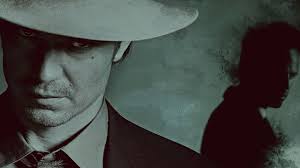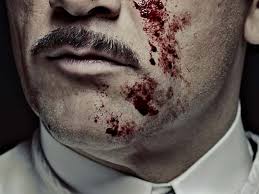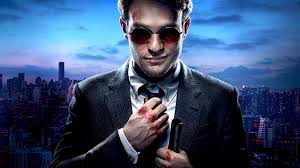Editor’s Note: This was meant to be a Top 10 List, but due to the plethora of great shows that aired this year and a 4-way tie for the 10th place spot, we sprawled it out to 15. The upshot of this is that the difference between one rank and its neighbors is even more arbitary than it always is for such Best Lists. But without further ado…
15. JESSICA JONES (NETFLIX)
When applied to superhero stories, words like “adult” and “mature” tend to mean something very specific – a particularly sadistic villain with less Dr. Doom and more Hannibal Lecter in their make-up, that will perpetuate heinous acts of violence and torment upon redshirts and/or less popular members of the supporting cast, so that the audience can feel fully justified in cheering the hero on to exact particularly vicious retribution. It’s the same childish Good vs. Evil set up, just with Evil rendered in particularly ghoulish fashion. Jessica Jones is grown up in a different way. It is about grown ups with grown up problems, as embodied by Krysten Ritter’s remarkably brittle but heartfelt performance. She is funny and sexy but bracingly caustic, genuinely and horribly damaged but determined, smart but dangerously self-destructive. She is a fully formed adult, and if her story is not markedly “mature” in presentation (no f-bombs or nipples, and not much in the way of really graphic violence), it is in content. Jessica is definitely what the DSM IV refers to as a Hot Mess, but the show doesn’t take any great pains to either soften her harder edges or berate her for her failings. She is an alcoholic, but an essentially functional one. This is something fiction consistently struggles to portray but thus far the series is able to show how this does not make her life any easier without reducing it to a plot obstacle that she has to get over via one dramatic breakthrough in a Very Special Episode. She has a relationship with Mike Colter’s Luke Cage that “messy” doesn’t even begin to do justice, which is par for the comic book course. But I can’t think of any other superhero romance that begins with the “hero” getting hammered and going home with the bartender, or that is so unapologetic about the principals straight up fuckin’, and enjoying it.
And then there is the entire central thrust of the series, which is about a woman confronting a serial abuser and rapist, a subtext so strong that it stops even being subtext early on. I’d expect a “superhero” show (though JJ really comes more off as a neo-noir detective story than a capes n’ tights adventure) to tackle this heavy material entirely by way the heroine going through enough training montages to be able to kick the bad guy’s ass. But the nature of this villain’s powers constantly reinforces that the real struggle is not whether the abused can find a way to batter the abuser back even harder, it’s breaking the mental hold that such trauma holds over even the super-strongest among us.
The show isn’t perfect, as Netflix has some issues to work out with the pacing of these binge-oriented originals. Daredevil had a couple episodes more than it had story, while JJ could have benefited from being either shorter or longer – the final stretch does fall into a sort of merry-go-round of near-misses, which could either have been pared down or padded out with more case-of-the-week type episodes between Kilgrave’s previous narrow escape and his latest one. But on the whole, they’re off to a fantastic start with their Defenders project, sketching out a seedy but fascinating underbelly to the more candy-colored, family friendly Avengers franchises.
Defining Moment: Luke and Jessica discover each other’s superpowers, and have to hold off on the exchange of exposition notes this requires until after they’re done super-screwing each other’s brains out.
– Al Schwartz
14. JUSTIFIED – (FX)
After a somewhat lame fifth season, which saw the normally-delightful shifting allegiances and tough guy gamesmanship of Harlan County becoming slightly rote, it seemed like Justified’s best days were behind it. It was both a pleasure and a relief to see it come back so re-energized for the home stretch. The creative team managed to provide all the things that made it such satisfying TV for most of its run, as well as an appropriate sense of finality and payoff. In stark contrast to the slew of anti-heroes that dominated TV drama for most of its run, Justified had an excellent straight-up hero in Timothy Olyphant’s Raylan Givens. And of course, they also had a pretty great antihero in his opposite number, Walton Goggins’ Boyd Crowder. Watching these two seasoned actors square off directly after five seasons of indirect maneuvering and uneasy alliances provided the spine and major tension of the final run, and it resolved in a way both unexpected and entirely satisfying.
But Justified was always bigger than its two leads, and the turf struggle over the seemingly-damned farms and hollers of Harlan County took a central role as well, led by another top tier guest villain, Sam Elliott’s weed mogul Avery Markham. Leading a flat out brilliant guest cast of genre favorites (featuring such badass types as Garrett Dillahunt, Jeff Fahey, Shea Whigham, and, surprisingly convincing as a gangster, Mary Steenburgen), Elliott provided a perfect Big Bad for the wrap up. The show’s roster of cool Elmore Leonard-y characters was deep, and virtually every single one of them came to a fate that felt appropriate, perhaps none more so than everyone’s favorite scumbag, Wynn Duffy. It was damn near impossible not to get invested in each and every one of them, which is what gave every vault robbery, manhunt, mine explosion, shootout or stand-off a sense of importance.
Defining Moment: Any time something crazy or violent happens within sight of Wynn Duffy.
– John Bernhard
13. THE KNICK (CINEMAX)
The Knick is the best show on TV. You will see other shows above it on this and many other lists but I submit that they are wrong. In fact, it is one of the best shows ever, because it is so singular, even among the ever-growing glut of original shows with which every channel and an increasing number of websites are flooding the airwaves fiber-optic cables. The thoroughly modern, kinetic camerawork and pounding electronic music are not an obvious fit for a period medical drama, but Steven Soderbergh and Cliff Martinez make it sing. They flawlessly realize the period setting, but never get lost in it, nor do they use it as a crutch, despite the inevitable clashes between our world and that of early 20th century New York.
The way Soderbergh uses every high tech tool in his disposal wipes the floor with the huge majority of Hollywood cinematography, and gives us such naturally-lit wonders as the scene of Cornelia looking around an abandoned house using only the light of a candle. The electronic drone that can accompany either a high society ball or a gruesome, dangerous surgery imbues all the scenes with a vitality and immediacy many costume dramas struggle to produce. This nervous energy can be as taxing as it is addictive.
Which goes a long way to explain how a show so bleak is also so watchable. Because this is a world where forcing underage conjoined twins into prostitution is not just possible, but actually elicits fewer consequences than performing abortions for poor women. Where a woman has to endure the creepy advances of her father in law, both because she’s afraid of him but mostly because she’s just not supposed to say anything about it. Where a talented black doctor is treated worse than a white alcoholic so messed up he’ll chug down formaldehyde. It’s a world so bleak that the episode where the mother of the show’s most likeable character dies in his hands is a comparatively light one. But fighting to handle the show’s heaviness is completely, inarguably worth it. Because there is nothing on TV that is quite as striking as The Knick.
Defining Moment: Herman Barrow explains to his wife the future of her living accommodations.
– Stelios Xenidis
12. DAREDEVIL (NETFLIX)
Agent Carter had already been a bit better than Agents of S.H.I.E.L.D. (he said, praising as faintly as the laws of physics will allow), but Marvel’s third live-action series hit right into the bullseye. For the first time ever, creators of a superhero show seriously attempted to hit the tone of The Dark Knight, or at least, of Batman Begins, and against all odds nailed it. Daredevil lead Charlie Cox may often feel too humble, but his shyness is a welcome change to the more talkative but bland leading characters of similar shows. Matt Murdock’s relatively fervent Catholicism may make him anomalous among contemporaries that would prefer not to alienate any of the audience that does not share his beliefs, but it gives him a specificity of character that is ultimately an asset to his show. This is bolstered by his strong relationships with his “useless sidekick” characters, and being about the only vigilante superhero to give more than the briefest of lip services to caring about the actual law. Though perhaps the upcoming Captain America: Civil War will change that.
Knowing that every hero is defined by his antagonist, acting chameleon Vincent D’Onofrio makes an amazing Kingpin. He’s not just a huge guy in a suit who loves to bark orders, though he does uncannily embody the cartoonish physicality of the comic book character in this much more grounded environment. He’s the best kind of antagonist: a complex, unpredictable, but a completely understandable broken mess of a human being. A really bad guy who thinks he’s actually doing the right thing.
This very first season doesn’t have much of a story to tell, but it does a great job of setting up Hell’s Kitchen and its charismatic inhabitants. It’s a place in which fights are exhausting for a change, in which bones actually do break, and one in which people are actually plagued by problems, emotional, spiritual, physical, even financial – how many superhero stories are there where the stakes are the possible eviction of a minor character? Although it’s a rather serious approach with a brooding lead, it never presents itself arrogantly enough to really believe it is deep, and thus has largely avoids the “pretentious” accusations that have plagued the Nolan-produced DC films. It might be a tale of a darker shade, but it’s still a fairly straightforward superhero show at heart, which allows it to be dramatic while still being fun.
Defining Moment: The long, brutal hallway fight that closes the second episode, showing off the series’ understated tone of action. The polar opposite of Agents of S.H.I.E.L.D’s brightly lit, bland fight choreography.
– Flynn Keaton
11. MASTER OF NONE (NETFLIX)
This ain’t my list, but if it weren’t for that pesky democracy bullshit, Master of None would be waaaaaay further up there, because it’s the smartest, most singular piece of new programming I’ve seen all year. Co-creator (with fellow Parks and Recreation alumnus Alan Yang) Aziz Ansari stars as Dev, a New York actor who’s doing fairly well for himself via infrequent roles in dumb commercials and dumber movies. He’s obviously got at least as much of Ansari in him as Alvy Singer did Woody Allen, and many others have drawn that self-same connection as Dev and his friends navigate the vagaries of life in the Big Apple, both outsized and mundane. But Master Of None earns such comparisons, without even the need to rely on voiceover to place us in the protagonists’ headspace, by being uniquely acute about its observation of the odd space between Generations X and Y, too old for millennial outrage and too young for Gen-X cynicism.
The show has a lot on its mind, but deftly avoids heavy-handed didacticism in favor of meaningful, intelligent and frequently hilarious discourse on race, immigration, responsibility, sexism, aging, and relationships. The first episode is easily the show’s weakest, but the second episode goes to wonderfully unexpected places when Dev and his parents (Ansari’s actual parents!) meet up with his friend Brian’s immigrant parents. The show is always sincere, and its low-conflict nature means the show is easy to watch and digest, while still managing some sneaky dramatic heft. But the humor, performances, and fantastic cinematography keep it engaging. It’s warm, it’s romantic, human, and I love it so much.
Defining Moment: Dev reads the “fig tree” passage from The Bell Jar, the frame breaking into a collage of potential futures for him. Beautiful and heartbreaking.
– Travis Newton
Tomorrow: Spies, zombies, and lushes from two different centuries as we get into the top 10.









